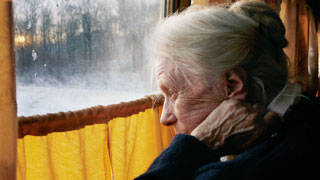The Woman with the 5 Elephants
Die Frau mit den 5 Elefanten SWITZERLAND, GERMANY / 2009 / German, Russian / Color, B&W / 35mm / 93 min
SWITZERLAND, GERMANY / 2009 / German, Russian / Color, B&W / 35mm / 93 min
Director: Vadim Jendreyko
Photography: Niels Bohlbrinker, Stéphane Kuthy
Editing: Gisela Castronari-Jaensch
Sound: Florian Beck
Music: Daniel Almada, Martin Iannaccone
Producer: Hercli Bundi
Production Company: Mira Film GmbH
World Sales: Nour Films
www.nourfilms.com
An elderly literary translator whose sharp gaze conveys a noble intellect. The hands with which she conscientiously carries out her work are engraved with deep lines that represent her memories of wartime. Born in Ukraine, she emigrated to Germany early during World War II and has continued to question her own past, even after gaining recognition for translating five of Dostoevsky’s major novels, which she calls the “Five Elephants.” On her first visit to her hometown after moving to Germany, the tumultuous history of Ukraine comes back to haunt her. Quietly tracing the life led by this woman, this film’s tranquil images gracefully illustrate the power of literature to cultivate human dignity.
[Director’s Statement] Swetlana Geier has been dealing with the possibilities and limitations of literary translation for more than 60 years. Much of her passion for her work relates to translation loss, the indeterminate area in which there are words in one language for which there is no correspondence in another. To her this is the arena of “translationally erotic instances”; here she enters terra incognita and has to take new linguistic paths by drawing on her deep knowledge of Russian and German culture. This creative stance, this enthusiasm for new form, informs her personality and her work and fascinated me from our first meeting onwards.
I began to take more and more of an interest in this woman and her daily life, in her work as a translator of Dostoevsky’s great novels and her sensuous handling of language. And through her, Dostoevsky’s essential questions about freedom and the relationship between means and end were given concrete and vital form. “Who am I?” This question is the internal motor of the central figures in Dostoevsky’s work.
Swetlana Geier has been confronted with Stalinism and National Socialism during her life. She left her homeland, Ukraine, to find herself in a completely different part of Europe. During the development of this project it became clear to me that I was once again dealing with the fate of a refugee or emigrant, with a person who has had to find her way between the grindstones of her era. It is a theme that I repeatedly come upon, one behind which the question of my own identity is concealed.
And so the question that drives Dostoevsky’s figures is also the internal pivot around which I meet this woman and her life.
 Vadim Jendreyko
Vadim Jendreyko
Born in 1965 in Germany, Jendreyko grew up in Switzerland. From 1983 to 1986, he worked as assistant director, camera assistant, and editing assistant on several film and theater productions. Since 1986, he has been active in documentary films as director, executive producer, and producer. In 2002, he and Hercli Bundi founded the film production company Mira Film, which follows this principle: “Every film we produce has to widen our horizon. It has to change our view and in effect of that our life as well.” Vadim Jendreyko’s films have been released in several countries and have received a number of national and international awards. He is a member of the European Film Academy. His films include Bashkim (2002), Transit-Zürich Flughafen (2003), Leistung am Limit (2004), and The Singing City (2010). |
